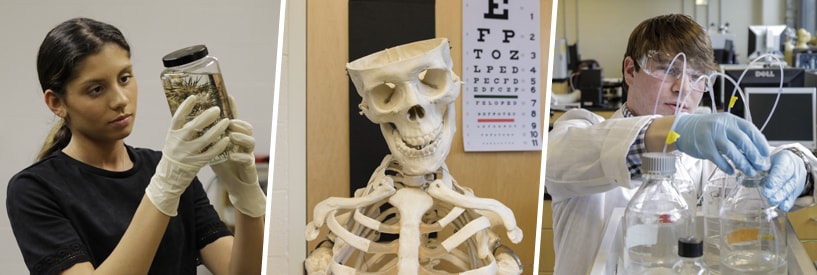Major in Biology

A major in biology requires a minimum of 10 courses in the biology department as well as courses from chemistry, physics, and mathematical sciences. The required courses are as follows:
- Biology: BL150/151, BL152/153, BL154/155, seven upper-level biology electives (see Elective Restrictions)
- Chemistry: CH101/CH105, CH102/CH106, CH301/CH307, CH302/CH308
- Physics: PH101/PH191, PH102/PH192
- Mathematics: MA251 or MA252 or ST210 or ST265
View the NEW Biology Advising Handbook
View the typical course sequence for a Bachelor of Science in biology.
View all biology course descriptions.
Majors are required to take one advanced course in each of the three major areas of biology: cell and molecular biology, structure and function of organisms, and ecology and evolutionary biology. The upper-level curriculum allows students flexibility to further explore the sub disciplines of biology and generally consist of a classroom component with associated laboratory and/or seminar experiences.
The discipline of biology is experiential in nature, meaning that students are active participants in their own education. The advanced courses include laboratory components in which students learn how to think and write like scientists while designing and executing an experiment. They also learn how to work cooperatively as contributing members of a team and develop a greater sense of academic community.
The general biology curriculum is flexible in the major's requirements for upper-division courses. This flexibility allows students to individualize their curriculum to suit their academic and career goals.
Things to note
- Biology majors should successfully complete BL150/151, BL152/153, and BL154/155 before starting their junior year.
- The math requirement (MA251 or MA252 or ST210 or ST265) may be taken anytime. Most students choose the sophomore or junior years. Students who plan to take General rather than Introductory Physics should arrange to take Calculus I and II during their first or sophomore year.
- Courses from BL100-150, BL152, and BL154 may be elected in partial fulfillment of the natural science core requirement for the non-natural science major.
- If a student decides to withdraw from either the lecture or laboratory component of co-requisite courses, then the student must withdraw from the corresponding lecture or laboratory course as well. Likewise, if a student fails either the lecture or laboratory component of co-requisite courses, both courses must be retaken with passing grades to receive credit within the biology major. A student will not receive credit for completing the lecture or laboratory-only either at Loyola or at another institution, unless the department chair gives written permission.
- To count in the biology major or an associated interdisciplinary major with biology, Human Anatomy and Physiology I (BL 206/BL 207) and Human Anatomy and Physiology II (BL 208/BL 209) must be taken at Loyola or a consortium school.
- Students interested in studying abroad will find many programs available to both biology and interdisciplinary biology majors. Students are encouraged to visit the Office of International Programs early in their careers to plan a course of study for Loyola and the host institution. Students should also consult their academic advisor.
- Honors students who complete the functional anatomy course while studying abroad in Glasgow, Scotland may not take Introduction to Anatomy and Physiology (BL 105), Human Anatomy and Physiology I (BL 206/BL 207), Human Anatomy and Physiology II (BL 208/BL 209), or Vertebrate Anatomy (BL 301) at Loyola.
- Students must complete the diversity requirement through a designated diversity core, major or elective course.
- Students interested in a career in other health fields such as medical, veterinary or dental should visit the Pre-Health Web site.